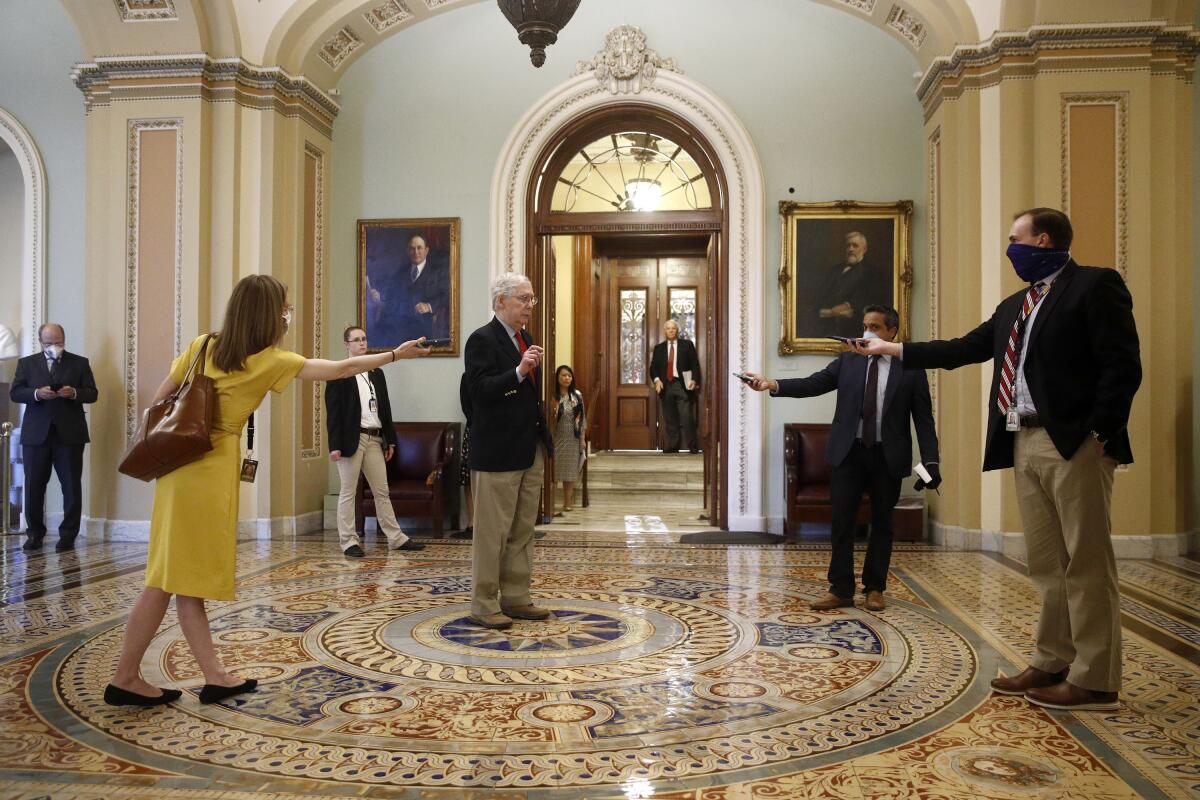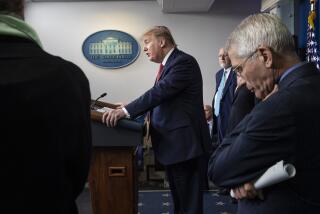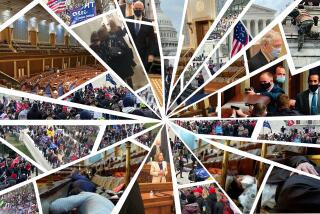Covering Congress amid coronavirus means masks, hallway contortions and apologies for the crying baby

- Share via
WASHINGTON — Phone interviews with lawmakers all start with the same disclaimer now: I apologize in advance for the screaming child. He’s fine, he’s supervised.
We learned quickly when The Times closed its Washington bureau because of the coronavirus in March that my 10-month-old could not handle seeing me pop in and out throughout the day while I worked from home. He has some separation anxiety, and after a week of missed naps and screams, my beleaguered husband suggested no more pop-ins to say hello, and that I sequester in the spare bedroom while I work.
But the baby can still hear me on the phone doing interviews, and has taken to standing at the foot of the stairs, rattling the baby gate and screaming “Hey!” — the one word he knows — like a hostage yelling for help from the basement.
Thankfully, most representatives and senators just laugh it off.
Like millions of Americans, my job has dramatically changed in the past month and a half.
Covering Congress is a physical, tactile job that doesn’t lend itself to social distancing. Capitol Hill is one of the few beats left in Washington where walking the halls in search of news is both viable and necessary to get the story.
For seven years, my days have included hours of waiting in marble hallways for news, chatting with staff members over coffee, shaking so, so many hands. Once or twice a day there’s a 30-minute burst of adrenaline as I grab impromptu interviews from members of Congress walking to and from votes, squeezing through crowds of hundreds of reporters, staff and representatives to find out what I need to know. The scrums of reporters pursuing senators for a quote can get so tight, I can name the deodorant brands worn by some of the biggest names in political journalism.
Now I write from a laptop resting on a bookcase in an empty room, listening to news conferences by phone, keeping an eye on what cable news has at the moment, wading through thousands of pages of legislation and regulations to track how the nearly $3 trillion Congress passed to deal with the pandemic is being spent — and sneaking downstairs to refill my coffee during my son’s nap.
Many members of Congress are eager to jump on the phone, but the process of working with a spokesperson to find time in their schedule is slower than grabbing whoever I need for three minutes before or after a vote.
On the bright side, it means I often get longer interviews. And it makes it easier to get the human moments: hearing about how they’ve caught their parents breaking the stay-at-home orders or which of their colleagues can’t manage to mute themselves during video conferences. At times I hear their children or dogs in the background as well. Occasionally it’s easier to get a scoop on the phone, without competitors breathing on the back of my neck in the Capitol.
But it also means only those who want to talk to me have to return my calls. When the assault allegation against Joe Biden jumped into the news, it suddenly got very difficult to get some Democratic senators on the phone. If I’d been on the Hill, my colleagues and I would have been waiting outside committee rooms, the Senate chamber, the elevators, even the bathrooms, to get a response.
Congress has largely been operating remotely since early March, with some notable exceptions. But with the Senate’s return this week and the House’s expected return next week, the job of covering Congress enters a new phase. With stay-at-home orders and social-distancing policies still in place in Washington, every day is a calculation of the risks. Can I get the information I need from home? Is the story worth traveling to the Capitol, securing the straps of a mask behind my ears and hoping that members of Congress and Capitol Hill staff are being as careful as I am?
Before businesses began shuttering in March I’d already been asked to stay away from The Times’ Washington Bureau for two weeks after learning I was in a news conference with someone waiting for test results. Since then, I’ve been in the same room in the Capitol with at least two others who tested positive, and that’s just the ones I know of.
More than a half-dozen members have disclosed their positive diagnosis; more have reported family members who are ill. At least two dozen people working on Capitol Hill, including Capitol Police officers, have reported positive cases.
Congressional leaders have rejected the White House’s offer of rapid testing, saying members of Congress shouldn’t jump the line before front-line workers. It is a reality that as members travel back from across the country, and thousands of staff members resume working from the Hill, I’ll likely encounter others who have been exposed. The Capitol physician recently warned House members that normal Capitol business may not resume for years.
A group of reporters have agreed to pool notes and audio from their hallway interviews in an attempt to limit how large the scrums get, trusting each other to ask the right questions, and to share the responses no matter how juicy. It’s allowed me to not have to visit the Capitol every day. But not everyone participates, and in the competitive atmosphere of Capitol Hill, I fear it won’t last. At the same time, we need to make sure the House and Senate do not impose new safety rules that unnecessarily limit reporters’ ability to freely gather information.
Inside the Capitol, signs are posted on walls, doors, elevators and floors reminding people to stay six feet apart. In a House Appropriations Committee hearing Wednesday, just 15 chairs were allotted for an audience that normally numbers more than 100. Instead, many lobbyists, advocates and staffers watched from home. Representatives spread out across the dais and pulled their face masks down temporarily to question witnesses about whether the country is reopening too soon. Rep. Tom Cole (R-Okla.) joked that his preferred mask makes him look like he’s in Al Qaeda.
Some senators wear masks, but others don’t, or take it off when they speak to reporters. I find myself torn between the desire to get the quote and the urge to scooch back from those that are bare faced. Mask or not, I turn my body to stand at a diagonal, straining a recorder forward to catch comments in the echoey halls of the Capitol.
A walk down a lengthy Senate hallway Wednesday while interviewing Sen. Chris Coons (D-Del.) became a comedy routine when we encountered Sen. Martha McSally (R-Ariz.) coming from the other direction. The senators, their staffs and I all try to squeeze through the logjam as safely and remotely as possible. “Give us a little space, keep moving, but we’re just gonna give Sen. McSally a little room to come on through,” Coons said, trying to guide me — without touching — to one side. None of us managed to stay the requisite six feet apart.
A lingering part of the daily calculation of whether to stay home or go to the Capitol is the knowledge that there are more stories to tell than I can possibly write. People are scared and concerned and they want to know what’s next. And the L.A. Times’ wonderfully vocal readers send me hundreds of story ideas and personal experiences, that mirror the questions I hear from my own family. Why don’t they qualify for unemployment benefits? When will the stimulus payout arrive and will another one follow? What will Congress do next and when? I have access to decision-makers in a way that many people don’t, and I feel an obligation to answer as many as I can.
After a brief trip to the Capitol on Wednesday, I calculate that I can get the rest of the interviews I need by phone. Back in the car, I begin a familiar routine: hand sanitizer, antiseptic wipe-down of all my supplies and then a shower when I get home before I can interact with the baby again.
My phone rings. And as I answer, I hear the shuffle of baby knees against the hardwood floor. The downstairs gate begins to rattle. And then the urgent refrain of “Hey!...HEY!”
“Hello, Senator,” I say. “Don’t worry. He’s fine.”
More to Read
Get the L.A. Times Politics newsletter
Deeply reported insights into legislation, politics and policy from Sacramento, Washington and beyond. In your inbox three times per week.
You may occasionally receive promotional content from the Los Angeles Times.











